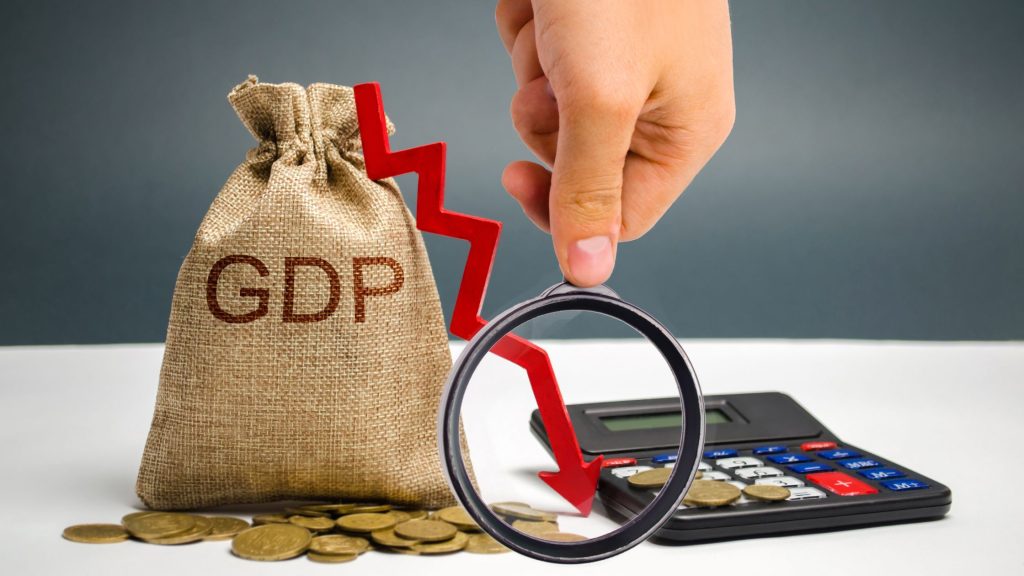Economic growth refers to an increase in the production and consumption of goods and services in an economy over a particular period. It is commonly measured by changes in Gross Domestic Product (GDP), which is the total value of goods and services produced within a country’s borders in a specific period, usually a year. GDP is calculated by adding up the value of all final goods and services produced in the economy and adjusting for any imports and exports. GDP is considered to be one of the primary indicators of a country’s economic health and is used to measure changes in economic growth over time.
Gross Domestic Product (GDP) is an essential indicator for forex traders to track because it provides valuable insights into the health and direction of an economy. Forex traders use GDP data to assess the strength of a country’s economy, which can have a significant impact on the exchange rate of its currency. When an economy is growing rapidly and producing a high level of output, it typically attracts more investment, leading to an increase in demand for its currency, and therefore, appreciation in its exchange rate. On the other hand, a decline in GDP or a slower rate of growth may lead to decreased demand for a country’s currency, causing depreciation in its exchange rate. Forex traders may also use GDP data to identify trading opportunities by analyzing the performance of different economies and identifying those that are likely to experience growth or decline in the future. Therefore, tracking GDP data is important for forex traders to make informed trading decisions and manage risk effectively.
How is GDP measured?
GDP is measured by adding up the value of all final goods and services produced within a country’s borders in a specific period, usually a year. There are three ways to measure GDP:
- Production approach: This method measures GDP by adding up the value of all goods and services produced within a country, including both domestic and foreign production.
- Expenditure approach: This method measures GDP by adding up the value of all goods and services purchased by households, businesses, government, and foreigners.
- Income approach: This method measures GDP by adding up all income earned by individuals and businesses in the economy.
Regardless of the method used, GDP calculations typically involve adjusting for inflation by using a price index such as the Consumer Price Index (CPI) or the Gross Domestic Price Deflator (GDP Deflator) to account for changes in the price level over time. By using a consistent method of measurement, GDP can be compared over time and across different countries to assess changes in economic growth and productivity.
Impact of GDP on Forex Trading
Changes and predictions in Gross Domestic Product (GDP) can have a significant impact on the foreign exchange market (forex) as they can affect the strength of a country’s economy and its currency. If a country’s GDP is growing rapidly, it indicates that its economy is expanding and producing a high level of output, which typically attracts more investment, leading to an increase in demand for its currency, and therefore, appreciation in its exchange rate.

We spoke about central banks and interest rates in some earlier articles so feel free to check those out for more information on how interest rates affect FX trading.
On the other hand, if a country’s GDP is declining or growing at a slower pace than expected, it indicates a weaker economic performance, which can lead to decreased demand for its currency, causing depreciation in its exchange rate. This can lead to changes in the exchange rate of the country’s currency, which can impact forex traders’ positions and profitability.
Predictions of future GDP growth can also affect forex traders’ positions as they may seek to buy or sell currencies based on expected changes in economic growth. Forex traders may use various economic indicators, including GDP data, to identify trading opportunities and manage risk effectively. Therefore, changes and predictions in GDP are closely monitored by forex traders to make informed trading decisions and stay ahead of the market.
Key Economic Indicators to Watch
When tracking Gross Domestic Product (GDP), there are several key economic indicators that forex traders should watch as they can provide important insights into the state of the economy and potential changes in GDP. Some of the key economic indicators to watch when tracking GDP include:
- Gross Domestic Product (GDP) itself: This is the most direct measure of the size and growth rate of the economy, and it provides valuable information on the overall state of the economy.
- Employment and Unemployment Rates: These indicators provide insights into the labor market and can indicate potential changes in GDP growth.
- Consumer Price Index (CPI): This measures the changes in prices of a basket of goods and services commonly consumed by households, providing information on inflation levels.
- Producer Price Index (PPI): This measures changes in the prices of goods and services produced by businesses, providing insights into the cost of production and potential changes in inflation.
- Retail Sales: This measures changes in sales of goods and services sold by retailers, providing insights into consumer spending patterns.
- Industrial Production: This measures the output of the industrial sector, providing insights into the level of production and potential changes in GDP.
By monitoring these economic indicators, forex traders can better understand the current state of the economy and make informed trading decisions based on potential changes in GDP growth.

Strategies for Analyzing GDP in Forex Trading
As a forex trader, there are several analysis strategies to consider when looking at GDP:
- Fundamental Analysis: This approach involves analyzing economic data to determine the underlying factors driving market trends. When looking at GDP, traders can use fundamental analysis to determine the overall health of the economy and predict future market trends.
- Technical Analysis: This approach involves analyzing price charts and other market data to identify patterns and trends. When looking at GDP, traders can use technical analysis to identify patterns in price movements that may be indicative of changes in the market.
- Sentiment Analysis: This approach involves analyzing market sentiment to determine the overall mood of traders and investors. When looking at GDP, traders can use sentiment analysis to gauge how other market participants are reacting to changes in economic data.
- Event-Driven Analysis: This approach involves analyzing market events, such as central bank announcements or political developments, to determine their impact on market trends. When looking at GDP, traders can use event-driven analysis to anticipate how policy decisions and other major events may affect the economy and currency values.
Conclusion: Leveraging GDP for Better Trading Decisions
As a forex trader, tracking GDP is important because it provides valuable insight into the health of an economy and can help predict future market trends. A country’s GDP is a measure of its economic output and is closely watched by traders as a key economic indicator. By tracking changes and predictions in GDP, traders can gauge the strength of a country’s economy and anticipate potential changes in interest rates or other policy decisions that may affect currency values. This information can help traders make better trading decisions by allowing them to enter and exit trades at the right time and potentially increase their profitability.




